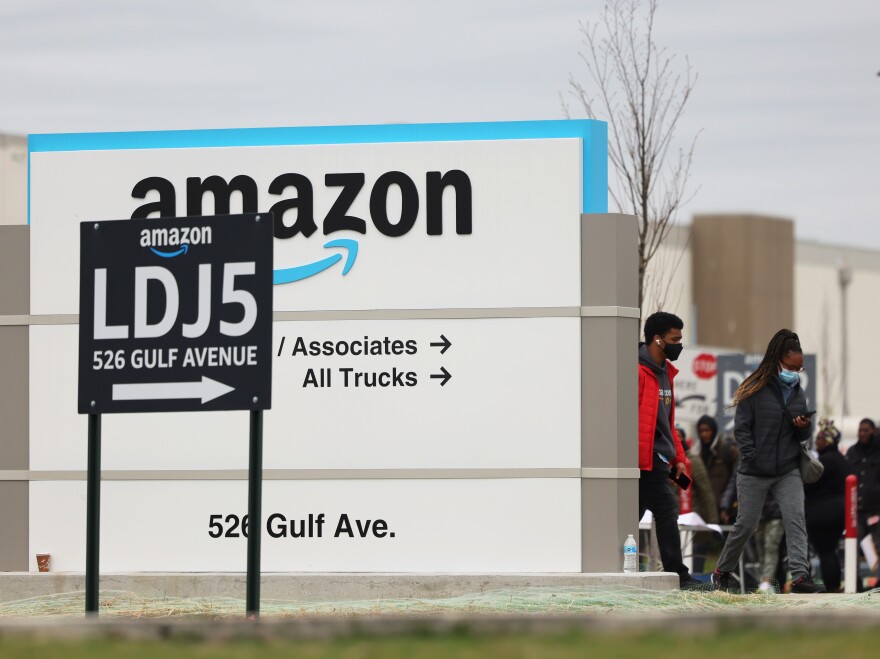After a breakthrough election victory at Amazon, the Amazon Labor Union fell far short of winning enough votes to unionize a second warehouse on Staten Island in New York.
The vote was 618 votes against the union to 380 votes in favor.
Roughly 1,600 workers were eligible to vote in the election, which was held in-person over four days last week. It's the second of four Amazon warehouses on Staten Island that organizers had set their sights on.
"We're glad that our team at LDJ5 were able to have their voices heard," said Amazon spokesperson Kelly Nantel in a statement, referring to the warehouse that voted. "We look forward to continuing to work directly together as we strive to make every day better for our employees."
The tally comes as a disappointment to the Amazon Labor Union, an upstart group founded by former warehouse supervisor Chris Smalls and his co-worker Derrick Palmer, who still works inside the massive fulfillment center that voted in favor of the union last month with 55% percent of the votes. Some 8,300 workers are employed at that warehouse.
As today's vote count was underway, the Amazon Labor Union tweeted, "No matter the outcome of the election, workers are uniting for change at LDJ5, JFK8 & around the world," referring to the two warehouses on Staten Island that have voted so far.
No matter the outcome of the election, workers are uniting for change at LDJ5, JFK8 & around the world.
— Amazon Labor Union (@amazonlabor) May 2, 2022
Mega-corporations continue to spend millions in union-busting + fear tactics & we continue to organize for a society not based on exploitation & greed. #UnionStrong
The Amazon Labor Union has been calling for higher wages, longer breaks, and better health and safety policies. Last week, Amazon met one of the union's demands by making permanent a pandemic-era policy of allowing workers to keep their cell phones with them while they work. The company had indicated it planned to roll back the policy, which was intended to give workers a way to communicate with their families around personal emergencies.
Meanwhile, Amazon has continued its anti-union messaging to workers, arguing through so-called "captive audience" meetings that they'd be better off dealing directly with Amazon rather than through a union. The company is also aggressively seeking to overturn the results of the first Staten Island election.
Within a week of that election, Amazon filed more than two dozen objections, charging, among other things, that union organizers harassed and threatened employees who weren't supporting the union and that the National Labor Relations Board's regional office in Brooklyn favored the union and facilitated its victory. The National Labor Relations Board granted Amazon's request to move the case to a different region for consideration, which is typical procedure when a region's conduct has been challenged.
In an order issued Friday, the NLRB regional director based in Phoenix, where the case has landed, ordered a hearing to be held on May 23, concluding that the evidence described by Amazon "could be grounds for overturning the election."
Support for the Amazon Labor Union grew since March, when few doubted that an upstart union led by former and current Amazon workers could defeat the e-commerce giant in a union election.
In the month since the union's win in the first election, its president Smalls has met with members of Congress, rallied with Rep. Alexandria Ocasio-Cortez and Sen. Bernie Sanders, appeared on The Daily Show with comedian Trevor Noah, and shared a stage with storied labor leader Delores Huerta. He's also talked with other unions, including the Teamsters, who vowed last year to organize Amazon from coast to coast, hiring a national director to spearhead the effort.
Smalls says he's heard from workers at more than 100 Amazon facilities around the country who are also interested in unionizing. Any facility seeking to hold a union election would need to gather the signatures of at least 30% of workers, an enormous challenge at Amazon given the high rates of turnover at its warehouses.
Meanwhile, there is still no outcome from the do-over union election at an Amazon warehouse in Bessemer, Alabama. Hundreds of contested ballots have yet to be resolved, and both Amazon and the Retail, Wholesale and Department Store Union, which organized the Bessemer campaign, have filed objections.
Copyright 2022 NPR. To see more, visit https://www.npr.org.




